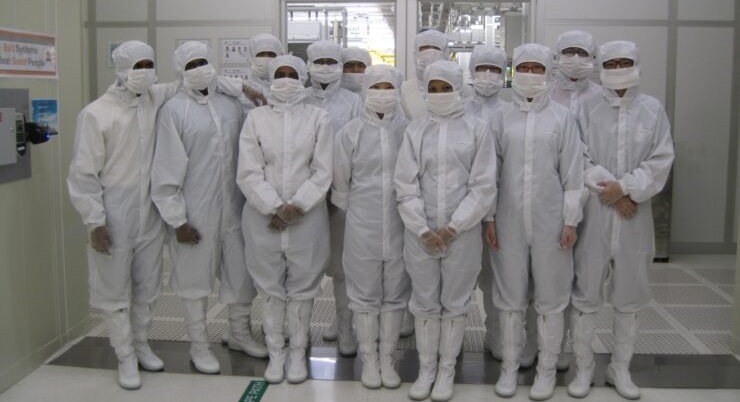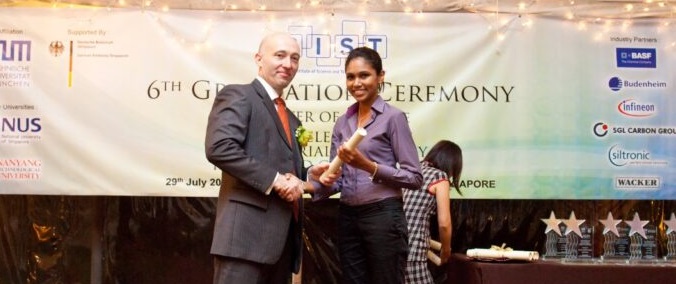
A passionate individual determined to make a promising career in the semiconductor industry while performing the balancing act of juggling between family and work, is Ms Anbumalar Manickam, or endearingly known as Malar, whom TUM Asia had the pleasure to find out more about her.
Having graduated with a bachelor’s degree in Engineering, Ms Malar Manickam was clear about where she wanted to begin her career: the semiconductor industry. The question was whether to continue her education and which programme she should choose.
“I was battling between the choice of pursuing a PhD or a master’s. The Master of Science in Microelectronics conferred by Nanyang Technological University (NTU) and the Technical University of Munich (TUM) caught my eye as it encompasses the breadth and depth of the study in the field of semiconductors. It gave me the opportunity to learn everything about the industry and bridge the gap in academic and industrial knowledge.”
When she learned that she was awarded a scholarship by this programme, “hard work truly pays off. My attachment to Germany as a result of the scholarship proved to be an extremely eye-opening experience. I met several passionate individuals in this field and had the first encounter of working between a semiconductor industry.”

Enamoured by the technologies and the pace of the semiconductor industry, Malar did not waste any time securing her first career as a research engineer at Agency for Science, Technology and Research (A*Star). Not long after, she was at the crossroads of her life, and this time, it was harder for her to choose.
“After working at A*Star for two and a half years, I had the choice of pursuing a PhD which would invariably propel my career forward, or thrust myself into a challenging and fast paced environment of this industry. I chose to join Micron Technology,” said Malar.
It was a decision that placed her right in the heart of the semiconductor action.
“Starting my career in A*Star allowed me to understand the cleanroom environment and obtain hands-on experience on the process and steps involved to produce various devices. It was usually project-based and served as a learning opportunity as we were given time to understand before moving forward. However, in Micron Technology, it was a different ball game. I did research in the US, where Micron Technology is headquartered, in which we brought the new technologies to Singapore for mass production. The environment in Singapore was extremely fast paced as we needed to ensure that we had a good head start in the competitive market. Witnessing the technology that I had a part in researching coming to fruition was extremely heartening, and it was one of the best parts of my career,” said Malar.
Reminiscing the frenetic days, she recalled, “There was once where the results were completely off the charts. We were baffled by the results and it was a moment of immense pressure. I managed to shut myself off from every distraction, sit down and focus on the problem. Thankfully, we managed to address it and come up with a working solution,” explained Malar.

“Looking back, the challenges I have encountered taught me never to give up, however insurmountable the problem might be. At that moment, it might appear unsolvable but we just need to persevere past that to obtain a solution,” said Malar.
Beyond research engineering, Malar had the opportunity to nurture a new generation of semiconductor enablers as well as career switchers. “I joined the training team because I wanted to pass down the knowledge I’ve learnt to the new hires. This is where the knowledge and experience I have amassed at TUM Asia came in handy. I was able to apply that knowledge and the experience I acquired through working in Micron, to share information with a personal touch,” said Malar.
“It’s been more than a decade since I joined the semiconductor industry. The major change that I have seen or experienced was that, in the past, the engineers would have to personally see to the nuts and bolts of the processes. Today with automation, nearly all configurations can be tweaked via a computer interface. Personally, the exhilaration of working hands-on is something that I will always remember,” reminisced Malar.
Having experienced all levels of action – from research to training and now programme management, Malar is well positioned to take on the overseer’s role to direct and nurture others.
When asked about her future, she said,” “Research engineering can be very unpredictable but exciting, and I love the adrenaline rush. On the other hand, I always felt that the management’s role of nurturing the new generation of leaders is something that I enjoy doing and now that I am beginning to have a family, I think it is a perfect situation to embark on this.”